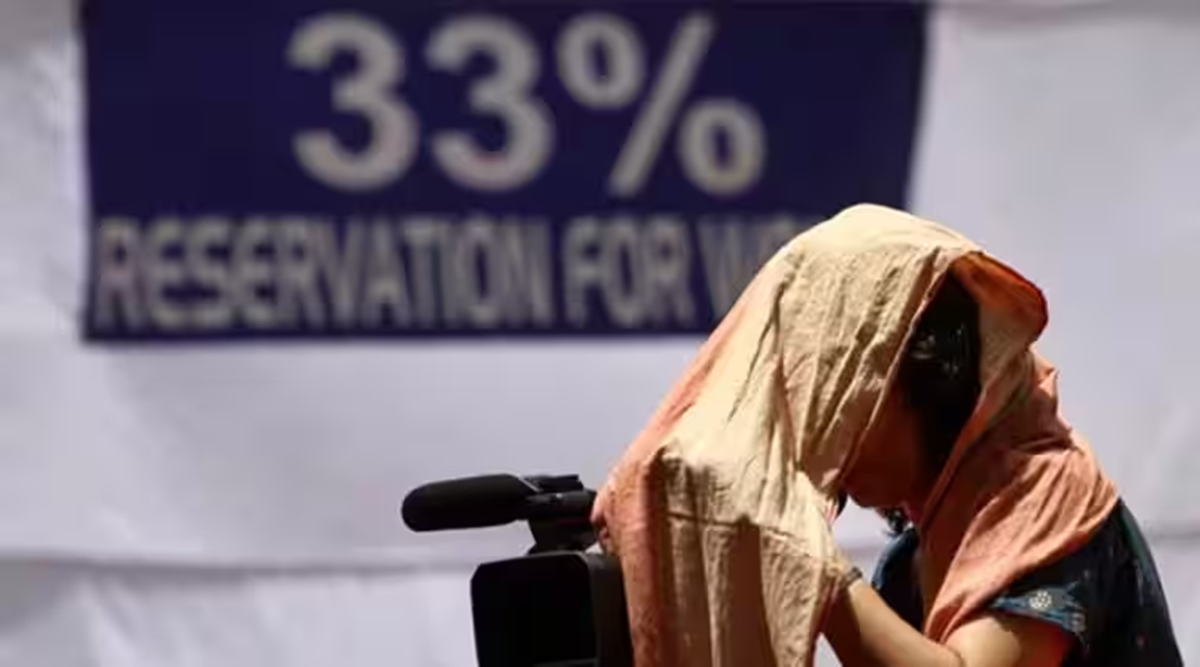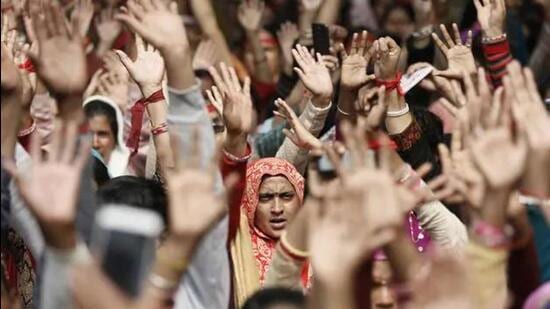SC questions Centre’s ‘silence’ on delay in women quota in Nagaland civic polls

SC questions Centre’s ‘silence’ on delay in women quota in Nagaland civic polls
The Supreme Court of India, on Tuesday, criticized the Centre for not taking responsibility for the non-implementation of the 33 per cent reservation for women in urban local body elections in Nagaland. The court observed that the Union government often takes “extreme stands against other state governments” that are not compliant with its directives, but it appears reluctant to address issues within its own state government.
During the hearing of a petition seeking directions for the implementation of women’s reservation in local body polls, Justice S K Kaul, who was presiding over a two-judge Bench alongside Justice Sudhanshu Dhulia, expressed dissatisfaction with the Centre’s approach towards the matter. The judges pointed out that since both the Centre and Nagaland’s state government share the same political dispensation, it should be easier for the Union government to actively participate in resolving the issue.
The reservation for women in local body elections is a significant step towards promoting gender equality and women’s representation in governance. The provision mandates a reservation of 33 per cent of seats for women in urban local bodies, ensuring their active participation and empowerment in the decision-making process at the grassroots level.
However, despite the importance of this measure, the implementation of women’s reservation in Nagaland has faced hurdles and delays. The petition before the Supreme Court highlights the urgency of addressing this issue and ensuring the effective implementation of the reservation policy.
The court’s remarks on the Centre’s approach towards Nagaland’s non-compliance with the women’s reservation policy reflect the need for consistent and unbiased enforcement of directives across all states, irrespective of political affiliations. It also emphasizes the Centre’s role in actively engaging with the state government to ensure the timely and proper implementation of policies aimed at fostering inclusive and representative governance.
Gender inequality remains a critical issue in India, and increasing women’s participation in decision-making processes is crucial for achieving true equality. Reservation policies have proven to be effective tools in advancing women’s participation in politics and governance, as seen in several other states where similar measures have been successfully implemented.

As the case continues to be heard, it is essential for all stakeholders, including the Centre and the Nagaland government, to work together to address the challenges and impediments to the implementation of women’s reservation in urban local body elections. By promoting women’s representation and involvement in governance, India can take a significant step towards achieving gender equality and building a more inclusive and progressive society.
The Supreme Court’s remarks serve as a reminder of the responsibilities of the Centre and the state government in ensuring that constitutional principles of equality and social justice are upheld and applied uniformly across the country. It is hoped that this case will lead to the resolution of the issue and pave the way for a more inclusive and representative political landscape in Nagaland and beyond.
Nagaland, with a coalition government led by the Nationalist Democratic Progressive Party (NDPP) and the Bharatiya Janata Party (BJP) as a partner, has been under scrutiny for its failure to implement the constitutionally mandated one-third reservation for women in urban local body elections, as prescribed in Article 243D of the Constitution.
The Supreme Court had earlier sought clarification from the Centre regarding Nagaland’s status concerning the implementation of women’s reservation. In response, Additional Solicitor General K M Nataraj, representing the Centre, confirmed that the Constitutional scheme applies to Nagaland as well, implying that the state is not exempted from the reservation policy.
However, despite the clear legal mandate, the reservation for women in Nagaland’s local body elections has not been put into effect, prompting the court to question the Centre’s inaction in enforcing the constitutional provision. The court pointed out that the Centre and Nagaland’s state government share the same political alliance, and hence, they should work in unison to ensure the effective implementation of the women’s reservation policy.
Justice S K Kaul expressed disappointment at the lack of progress in implementing the reservation policy, and he urged the Centre to take proactive measures to enforce the constitutional mandate. He emphasized that the government’s political alignment should facilitate the implementation process rather than serving as a hindrance.
The court’s concerns reflect the need for collective responsibility and concerted efforts from both the Centre and the state government in upholding constitutional principles and promoting gender equality. The reservation for women in local body elections is a crucial step towards empowering women and ensuring their representation in decision-making bodies at the grassroots level.

As the case progresses, it is essential for the Centre and the Nagaland government to collaborate in resolving the issue and taking concrete steps towards implementing women’s reservation. The court’s observations serve as a reminder of the importance of upholding constitutional values and the commitment to ensuring social justice and equal representation for all citizens.
By working together to implement the women’s reservation policy, the Centre and the Nagaland government can set a positive example for other states and reinforce the significance of women’s participation in governance and public affairs. As India strives to build a more inclusive and egalitarian society, promoting women’s representation in political institutions becomes a critical aspect of achieving true democratic ideals.
During the Supreme Court hearing, the Additional Solicitor General (ASG) acknowledged that the Nagaland state government had initiated steps towards implementing the women’s reservation policy. The ASG urged the court to grant some time to the state, considering the prevailing situation and challenges faced in the process.
Justice S K Kaul emphasized the significance of reservation as a form of affirmative action, ensuring a minimum level of representation for women in local bodies. He stressed the importance of promoting gender diversity and women’s participation in decision-making processes.
The Advocate General of Nagaland, K N Balgopal, cited the complex situation in the state. He explained that while the government had decided to implement the reservation for women, tribal bodies’ frequent calls to boycott the elections were creating obstacles in the implementation process.
The court’s deliberations reveal a delicate balance between implementing affirmative action for women’s representation and addressing the unique challenges in Nagaland. The reservation policy is intended to empower women and enhance their participation in governance. However, the prevailing situation in the state, including tribal sentiments and election boycott calls, poses hurdles to the effective implementation of the policy.
In such circumstances, a careful and comprehensive approach is necessary, where the state government, along with the Centre, must address the concerns of various stakeholders and ensure the successful implementation of the women’s reservation policy. Balancing the principles of affirmative action with the sensitivities of the local context becomes crucial in achieving a fair and inclusive representation of women in urban local body elections.
The court’s observations and the government’s response underscore the importance of a multi-dimensional approach in promoting gender equality and women’s participation in the democratic process. While affirmative action is a powerful tool for social transformation, it must be adapted to the specific needs and circumstances of each region to achieve its intended objectives effectively.
As the case continues, it remains essential for all stakeholders to engage in constructive dialogue and find ways to overcome the challenges in implementing women’s reservation in Nagaland. By collaborating with tribal bodies and addressing their concerns, the state government can pave the way for a more inclusive and representative political landscape, advancing the cause of gender equality and democratic ideals.
During the proceedings, Justice S K Kaul highlighted the role of law-making in driving social progress and change. He emphasized that often, laws act as a catalyst for social transformation, pushing society towards positive developments. Many changes that have occurred since India’s independence in 1950, leading to advancements in various spheres, might not have been possible without the impetus provided by legislative measures.

Justice Kaul acknowledged that resistance to change is inherent in maintaining the status quo. However, he stressed that someone must take the initiative to bring about necessary transformations and address issues of gender representation and equality.
The petitions before the Supreme Court challenged the decision of the Nagaland Assembly in September 2012, where it exempted the application of Part IX-A of the Constitution, which mandates 33 percent reservation for women in local bodies. Although this exemption was withdrawn in 2016, the reservation has not been effectively implemented in the state.
In April of the previous year, the Supreme Court had asked the Nagaland state government to clarify its plan for implementing the reservation policy. Subsequently, the State Election Commission informed the court in March 2023 that local body polls would be held in May. However, the notification was later canceled due to the boycott by certain tribal groups, further delaying the implementation of the reservation.
The Supreme Court’s observation underscores the crucial role of legislative measures in fostering societal changes and addressing gender disparities. By advocating for the effective implementation of the women’s reservation policy, the court seeks to promote gender equality and inclusivity in the political landscape of Nagaland. The court’s emphasis on the need for proactive steps to drive social progress sends a strong message about the importance of affirmative action in achieving a more equitable society.
As the case continues, the court’s stance serves as a reminder to all stakeholders, including the state government, to take concrete actions towards ensuring the effective implementation of the reservation policy for women in local bodies. By overcoming obstacles and engaging in constructive dialogue, Nagaland can move closer to fulfilling its commitment to gender representation and inclusive governance.
On April 5, 2023, the Supreme Court stayed the decision of the State Election Commission (SEC) to cancel the local body polls in Nagaland. On Tuesday, during the recent hearing, the Supreme Court gave the state government one final opportunity to rectify the situation and implement the mandated 33 percent reservation for women in local bodies. The court made it explicitly clear that this is the “last of the last opportunity” for the state to comply with the constitutional provision.
The court’s stern stance emphasizes the urgency and importance of fulfilling the constitutional requirement of providing adequate representation to women in local governance. By providing the state government with a final chance to take appropriate action, the court seeks to ensure that the reservation policy is effectively implemented, addressing the gender disparity in the state’s political landscape.
The Supreme Court’s decision reflects its commitment to upholding the principles of equality and inclusivity enshrined in the Constitution. The court’s insistence on the implementation of the reservation policy sends a strong message about the significance of women’s participation in decision-making processes at the local level.
As the state government gets this last opportunity to demonstrate its commitment to gender representation and social progress, it is expected to take decisive steps towards conducting fair and inclusive local body polls. By doing so, the state can pave the way for greater gender equality, empowerment, and meaningful participation of women in governance and development initiatives.
The Supreme Court’s observation reiterates the importance of adherence to constitutional mandates and highlights the court’s role in safeguarding democratic principles and social justice. As the case progresses, all eyes will be on Nagaland to ensure that the state fulfills its obligation to provide equal opportunities and representation to women in local governance, thus fostering a more inclusive and equitable society.




